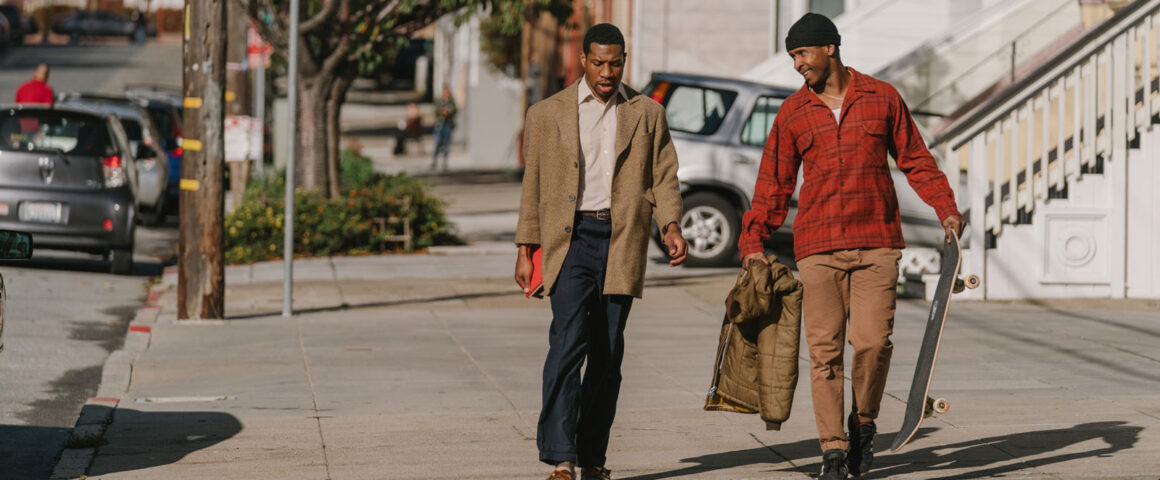The San Francisco I knew as a young man was a place with a sense of community and culture that welcomed the adventurous, the imaginative, the creative, and the marginalized. Though, like every other major U.S. city, it was not always a place of harmony, and some neighborhoods had its dangers for outsiders, yet it was a city with a truly diverse population and a rich bohemian culture which has now all but disappeared. Joe Talbot’s first feature, The Last Black Man in San Francisco, laments the heart of a city that has been broken by gentrification but celebrates the beauty that remains. Gorgeously shot by cinematographer Adam Newport-Berra, and aided by a pensive score by Emile Mossei, the film is an affecting work that is based on Talbot’s lifelong friendship with Jimmie Fails who plays a fictional version of himself, a young black man estranged from a place that he once called home.
Winner of the Directing Award at the 2019 Sundance Film Festival, the film opens as two men, Jimmie (Jimmie Fails) and his best friend Montgomery (Jonathan Majors, “Out of Blue”) wait impatiently for a bus to take them to the city as a droning preacher (Willie Hen) stands on a soapbox shouting “Remember your truth in the city of façades.” It is a message that reverberates throughout the film. Mont and Jimmy are headed to an old Victorian home on Golden Gate Avenue which Jimmie claims his grandfather built in 1946. The house, in what used to be a working class neighborhood, was lost by his father James Sr. (Rob Morgan, “Mudbound”) in the 90s and Jimmie is obsessed with getting it back.
With pride, Fails claims that his grandfather was the first black man in San Francisco. Though this is little more than an urban legend, it provides him with a rationale for what he thinks is his historical claim to the house. Much to the chagrin of the older white woman (Maximilienne Ewalt, “Sense8” TV series) who owns the house, Jimmie often comes to touch up the paint on the windows and take care of the lawn but has to duck the fruit the owner throws at him while demanding that he leave the premises. The taciturn Jimmie works part-time as a nursing home attendant and Mont works at a fish market though he is also an artist, writer, and playwright.
Sadly, Jimmie’s family is scattered and he has no home. He sleeps on the floor of Mont’s house and, in an evening of warmth and friendship, they are shown watching the 1949 San Francisco film noir “D.O.A.” on TV together as Montgomery narrates for his blind grandfather (Danny Glover, “The Old Man & the Gun”). Across the street from Mont’s house, a group of young macho studs taunt the two friends presumably for their lack of “toughness,” but it later becomes clear that much of it is posturing. In two striking scenes, Jimmie travels across the bridge to have some reflective conversations with his Aunt Wanda (Tichina Arnold, “Wild Hogs”), and in a funny but heartbreaking encounter, runs into his mother on the bus but their reunion is as uninvolved as it is fleeting.
To underscore the sense of displacement, Bobby (Mike Epps, “Resident Evil: Extinction”), a friend of James Sr., lives in Jimmie’s dad’s old car and insists on giving the two friends a ride into town which they reluctantly accept. In a scene that typifies the old spirit of San Francisco, Fails sits on a bench and is joined by a completely nude, older man (David Usner, “Roxie”), a scenario that scarcely raises an eyebrow with the exception of some rowdies passing on a tour bus. Things turn when the current owner of the old Victorian dies and it looks as if a legal dispute will tie up ownership rights for some time.
Acting quickly, after a real estate broker tells them the house would cost four million dollars to buy, they transport the family’s old furniture, mostly still in good condition, into the mansion and move in as squatters. Though Jimmie still follows his dream, he knows that trying to recreate the house as he remembers it is a delusion, a fact he is forcefully reminded of by Mont in a play performed before a small audience in a corner of the old house. The Last Black Man in San Francisco captures the bonds of love and friendship that exist between people, bonds that transcend the changes brought by social and economic dislocation.
To put it in perspective, Reverend Danny Nemu once said, “Some mourn as their edifices crumble; but for the open-eyed and uninvested, all that is lost is that which lies between them and deeper understanding.” Talking about his relationship with Mont, Fails agrees, “All I want is for friendships like ours to be able to exist,” he says, “and that doesn’t exist in the new San Francisco. That’s really what it’s about, getting back to that point where artists and outsiders can live there. Where weirdos who didn’t feel accepted could come because that’s what it used to be about. That’s the best San Francisco in my eyes.” It is the idea of San Francisco The Last Black Man in San Francisco lovingly conveys.




'Movie Review: The Last Black Man in San Francisco (2019)' has no comments